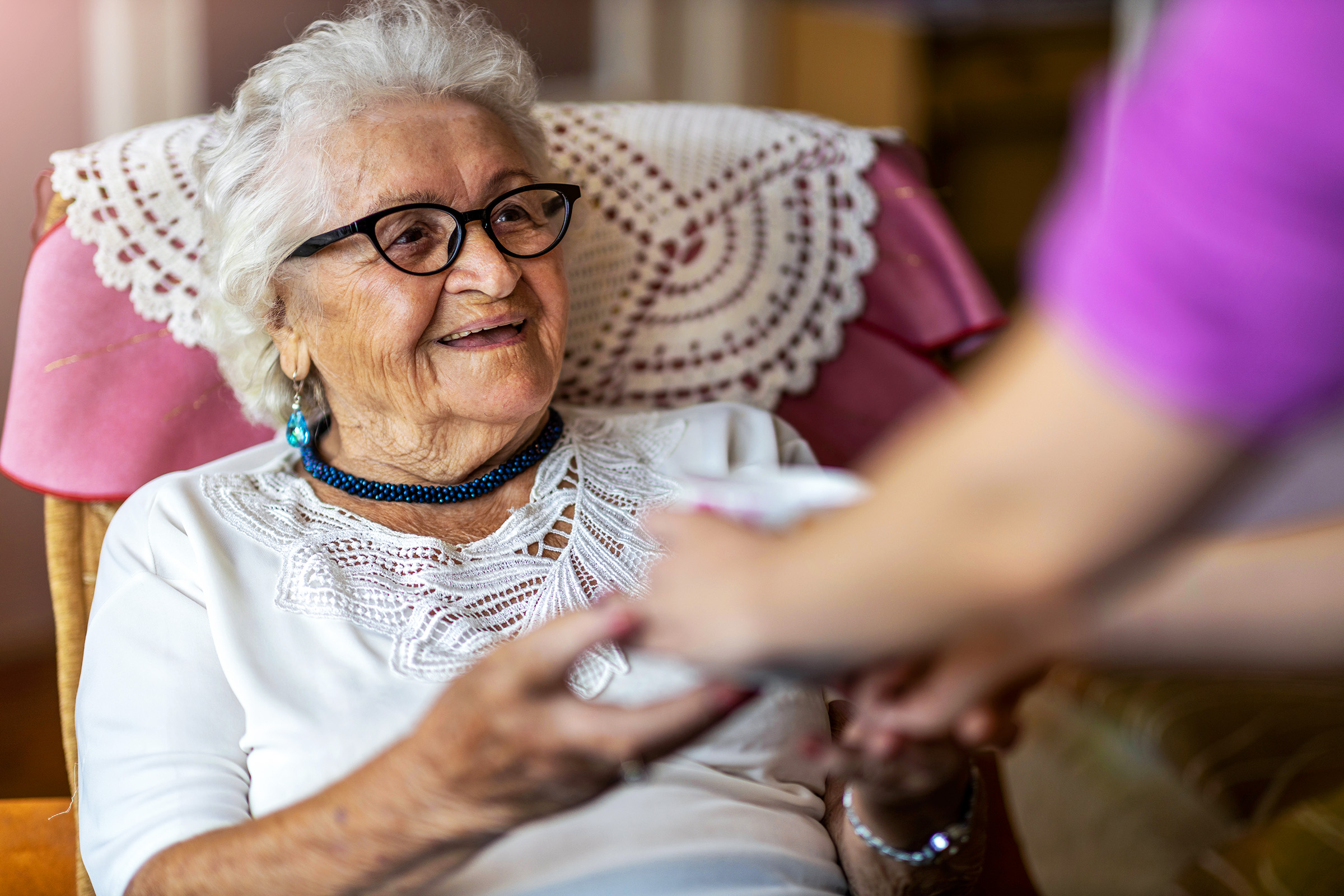Debra Westbrook never imagined she’d be accused by the police of stealing her mother’s pets. But that’s exactly what happened one evening when the sheriff showed up after her mother, who lived next door, reported the “theft.”
In that moment, Westbrook realized that dementia was rewriting her mother’s reality—one hallucination at a time. Her mom thought Westbrook had snuck in and out of her bedroom window and left with a cat under her arm.
At first, it was deeply upsetting, Westbrook told The Epoch Times.
“She looked at me so seriously and said, ‘Debra, I saw you,’” she said.
In hindsight, Westbrook sees the humor in such an improbable accusation.
“I learned then that caregiving for someone with dementia means accepting a new reality and learning to navigate it without judgment or argument,” she said.
That night marked the beginning of a long, frustrating, but ultimately transformative experience for Westbrook and her husband, Billy, as they cared for her mother and her mother-in-law, both of whom had dementia.
Dementia can affect everything, from memory to behavior that often leads to challenging moments. At her wits’ end, Westbrook contacted the Social Service Department of Aging and took what she called a “crash course in dementia care” with a counselor.
Dementia can manifest in different ways, Westbrook said.
“For mother, it was the hallucinations; for my mother-in-law, it was the flight risk.”
But Westbrook found herself learning crucial lessons, from how to prevent a loved one from wandering to the importance of legal planning. Hard-won insights helped her navigate a labyrinth of emotional and practical challenges.
Avoid Arguments: It Makes Things Worse
One of the most important lessons Westbrook learned in caring for her mother, Gerry, was that arguing was a losing battle. Arguing not only disrupts a sense of safety, but it can also escalate distress.
Many of their disagreements arose around Gerry’s growing inability to maintain her independence and autonomy, especially when it came to tasks such as shopping, cooking, or dressing herself. She couldn’t bend over to put on socks nor could she stand for extended periods of time.
Gerry struggled with memory and problem-solving. Westbrook said that conversations involving simple tasks, such as feeding and changing the litters for her cats or hiring people to do yard work, could quickly spiral into confusion and unnecessary tension. These exchanges, although initially straightforward, soon became overwhelming for Gerry, as she would forget the number of pets she had and that she needed regular lawn care.
To avoid arguments, especially in moments when Gerry made false accusations, such as accusing her son-in-law of taking her hammer from the shed, Westbrook and her husband learned to recognize that these claims were rooted in her increasing sense of vulnerability and confusion. By offering reassurance, they could prevent unnecessary tension and help her feel more secure.
“So we validated her feelings and told her that ‘Billy thought the handle needed cleaning,’ even though the incident never occurred,” Westbrook said.
“They have one reality, and that’s their safe place. You cannot and should not challenge that.”
Engaging in a back-and-forth or presenting logical explanations often leads to anger or heightened anxiety in a person with dementia.
Experts agree that arguing with someone living with dementia can exacerbate confusion and agitation. According to the Alzheimer’s Society, people with dementia may not always recognize or retain facts but are highly attuned to emotional cues—such as tone of voice or body language. Even if the caregiver’s facts are correct, the emotional tension created by the disagreement can increase feelings of fear, insecurity, and agitation for the person with dementia.
Instead of battling, Westbrook learned to let go of logic and focus on her mother’s emotional needs, allowing her to feel safe in her reality.
Pivot: Redirection Eases Tension
She also learned how to deflect—sometimes with a subtle shift, sometimes with a quick change of subject, but always with the goal of protecting Gerry from the emotional whiplash of confusion.
“Steer them away before they spiral,” Westbrook said. “Once they start heading down that path, you have to be a step ahead, redirecting them before it gets too out of control.”
For Westbrook’s mother, spiraling often meant she would become overwhelmed by frustration or anxiety. This would usually trigger visible signs of distress, such as shortness of breath, hive-like patches on the face and, occasionally, the clenching of her hands over her chest. Gerry would begin making accusations in an anxious loop, unable to break free from the paranoia that was consuming her. In those moments, it became clear that Gerry was slipping into anger and anxiety.
These behaviors were often triggered by confusion or a sense of lost control. For instance, Gerry became obsessed with doing a full bathroom renovation. Telling her it was both beyond her budget and unnecessary only heightened her agitation.
“She had lost the ability to be her own boss and make her own decisions,” Westbrook said. When she saw these cues—repetition, physical tension, and signs of anxiety—she knew a redirection was needed.
To change the subject, she’d use a framed photo of Gerry or a personal object in the room to gently shift her mother’s attention, saying, “Oh, is that the photo from when you were 4 years old?”
This subtle pivot would refocus Gerry’s attention, guiding her away from distressing thoughts and to something more comforting. The goal was never to dismiss her feelings, but to prevent the anxiety from escalating.
Nurses often use redirection as a technique for managing these moments in nursing homes. The National Institute on Aging recommends shifting the focus of a conversation to reduce agitation and allow the person to feel more comfortable.
Think of it like pumping the brakes to slow down a car—just a little nudge to change direction.
“It calms them down,” Westbrook said.
Give Tasks: They Keep Loved Ones Engaged
The unpredictable nature of dementia also meant Westbrook couldn’t sit idly by, waiting for the next emotional wave to crash. Her mother-in-law, Jean, was highly mobile and physically capable. Westbrook found that giving her something to do helped her feel purposeful and kept her mind active.
“Jean loved to sweep, rake, and help around the house,” Westbrook said. “All we had to do was hand her a rake, and she’d get to work. If I gave her a dust cloth or asked her to snap beans, she was content.”
Creating a structured routine was crucial. Jean thrived on predictability, and tasks gave her something to look forward to. Westbrook and her husband found that routine helped prevent restlessness. Keeping Jean engaged wasn’t always easy, but when she had something to focus on, the storm of restlessness subsided.
Creating a sense of purpose, even in small tasks, can help reduce restlessness and agitation, according to the Alzheimer’s Association. The association recommends structured activities, which can provide a sense of accomplishment.
“She needed to feel like she was still part of the family, still contributing,” Westbrook said.
Flight Risk: Prevent Wandering
As Jean’s dementia progressed, her wandering became a source of anxiety for the Westbrooks. The fear of Jean going out without their knowledge was always hovering in the background. One morning, it became all too real when Jean was seen heading toward the highway in her golf cart.
“We were jolted by a truck pulling into the driveway,” Westbrook said. The driver opened the door, and out stepped Jean, who had gotten lost.
“She told us she was coming to see us,” Westbrook said, even though Jean’s house was just at the end of their driveway.
Wandering is a common behavior in people with dementia, especially as they progress into more severe stages, according to the Mayo Clinic. It often stems from confusion, fear, or an unmet need. For example, a person may wander because he or she no longer recognizes familiar surroundings or feels disoriented in a space.
Even with the doors locked, “she’d get out at night and be in the yard, sometimes in the woods, digging in a ditch with a shovel and rake,” Billy Westbrook told The Epoch Times. To keep his mom safe from her late-night confusion, the Westbrooks had to set up a bed for her in their bedroom.
“My mom had always said she didn’t want to be a burden to us, and years before, she told us about two nursing homes she trusts,” Billy Westbrook said.
“After another year, we moved her into one of those. It wasn’t easy, but it was for her safety.”
Legal Prep: Don’t Delay Power of Attorney
When the Westbrooks realized that Gerry’s dementia had taken a serious toll on her decision-making, it was too late to act immediately. Without legal power of attorney, “I was powerless to make important medical decisions for mother,” Westbrook said.
“I had to go through the court process to get guardianship,” she added. “If I had that power of attorney earlier, I could have gotten her the medical help she needed sooner.”
Gaining guardianship over her mother was a drawn-out process that required patience, money, and time. The process dragged on for three months and cost more than $3,000—an emotional and financial strain that deepened their stress.
Gerry had been refusing doctor visits for more than a year, and while the Westbrooks did their best to keep her calm and free from anxiety, they could no longer validate her feelings when her health condition worsened. Without legal authority, however, Westbrook had no way to ensure that Gerry had the care she needed but was refusing.
When guardianship was finally granted and Gerry saw a specialist, the diagnosis was devastating for everyone: Stage 4 colorectal cancer.
Westbrook advised anyone in a similar situation, “Don’t wait until it’s a crisis.”
“You need that power of attorney before things get too complicated,” she said.
Avoid Losing Your Cool: Get Support
It’s easy to lose your cool when everything feels out of control. For Westbrook, staying calm was a survival tactic—something that became instinctual over five years of caregiving.
“I had to breathe,“ she said, reflecting on how she kept herself grounded through the stress and constant ups and downs. “I had to learn to take those moments and just breathe deeply.”
Westbrook’s go-to method for staying calm was Dr. Andrew Weil’s four-seven-eight breathing technique, which she used whenever she felt overwhelmed. To do it, inhale quietly through your nose for a count of four, hold your breath for a count of seven, then exhale slowly through your mouth for a count of eight.
This pattern, she said, really helped calm her when she felt tense. At night, she’d also practice deep breathing before falling asleep, but only by holding her breath briefly before exhaling.
“I found peace in that brief moment before breathing out,” she added.
But even the most composed caregivers need help—and Westbrook urged others to find support. Caregiving is deeply rewarding, but also all-consuming. It wasn’t just her mother and mother-in-law who needed her attention—it was herself, too.
Westbrook made time to swim at the gym twice a week and joined a group of retirees and seniors who, like her, had caregiving stories to share. The camaraderie and physical activity gave her a much-needed outlet.
It’s important to find someone to talk to and swap stories with because, sometimes, that’s what gets you through.
“You can’t pour from an empty cup,” Westbrook said.









